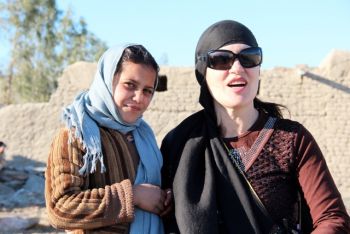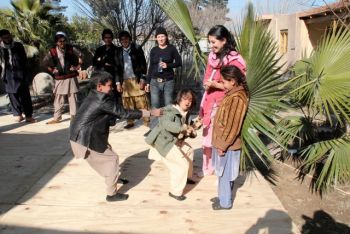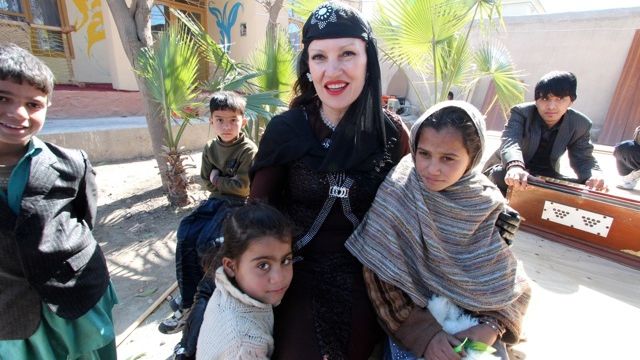Theatre in a Time of War
Australian actress Hellen Rose believes theatre can make a difference. After finishing a season of her one-woman show Dangerous Curves and Hairpin Bends in Sydney, she took the leap and jumped on a plane to Afghanistan.
She reports from The Rose Theatre at The Yellow House, Jalalabad.
I first started writing this article one week after Americans burned copies of the Quran, which sparked deadly riots, both in Kabul and in Jalalabad. All foreigners became targets of anti American hatred. Now one American has again done the unthinkable and killed 16 people including 9 children sleeping in their beds.
The last crisis meeting our neighbors had resulted in them insisting we raise our front wall from 10 to 15 ft high. I wonder now how we stand with them!
One week ago we rolled around the corner, a block from home, when a suicide bomber blew himself up at the checkpoint we pass daily. We arrived after the explosion so we weren’t hurt. The bomber’s decapitated head and arm were dangling in a tree, where they landed after the explosion. The target was the girls’ school just up the road from us.

Suddenly American ‘Black Hawks’ appear from nowhere, flying low over us as we pull into the driveway in our dust congested car. The giant blue iron gates bolt behind us, and here we are, back at our cultural oasis, The Yellow House, Jalalabad!
I stumble my way out of the back seat, dying to get the burqa off; the claustrophobia has reached madness level. The frustration lifts with the stifling nylon gag and my eyes are met with a rarity here; joy. A colourful bunch of smiling faces instantly surrounds us.
Our team of actors and musicians has carried on rehearsals regardless. A more vibrant bunch of freedom fighters was never before dreamt of! These good looking young adults in their 20’s to 40’s are real life heroes as well as film and stage heroes. They have never known anything but war, in a country that has been at war for over 30 years.
It is just getting warmer and the summer offensive has begun, a kind of ‘summer of hate’.

When making The Miscreants Of Taliwood in 2007, Australian artist and filmmaker George Gittoes started meeting young fellow artists and actors in Afghanistan and Peshawar, caught in a war they were trying desperately to fight with art alone. Their weapon is simply never giving in to the hatred of the Taliban, who blow up their video stores, theatres and radio stations, appear where they are filming or performing and attack them, or threaten them.
Female actors, however, run the highest risk and are tortured and killed for singing, dancing or acting, live or on film.
In December 2011, George wrote me an email saying, “We’ve got our own house! In Jalalabad!” Many women might respond with, “What about Paris or Berlin darling?” But I knew this would be a once in a lifetime opportunity to come here under George’s extraordinary protection and help my fellow actors, especially these incredibly brave women. I had just finished the season of my one-woman show, Dangerous Curves and Hairpin Bends, in Sydney, and took the leap and jumped on a plane to Afghanistan.
It is extremely difficult to find information on the history of theatre in this diverse region known as ‘Middle Asia’, and the ancient Silk Road; a place once thriving with nomadic tribes, dancers, musicians and poets glittering in jewels, along with traders of silks and furs, all bustling along the dusty well trod road.

The performing arts here have evolved from Sufis with their poems and music to whirling, heavily bedecked dancers, dripping with glitter and veils, truly a land of magic childhood dreams. Theatre now, sadly, has evolved into a less mystical theatre, recently influenced by the political styles of Russian Social Realism as a result of the Russian invasion of Afghanistan in 1979 -1989, and has lead to experimentation with the theories of Augusto Boal and Bertholt Brecht.
All music, dance, theatre and film was absolutely banned during the Taliban regime, when computers were strung up in the streets along with their owners. The arts are still under threat from insurgents here, though they are now, bravely, taking baby steps out into the light once more.
I became fascinated by two Afghan myths. One is the beautiful story of the Simorgh, a mythical bird who represents all that is just and kind with humanity, with the head and body of an eagle, the legs of a lion and the tail of a peacock. The other is a sinister creature, known as the Al, with hair of serpents, teeth of brass, nails of iron and with reversed feet – The king of Als lies in a hidden world where he constantly screams in anger.
These two wonderful elements of good and evil, beauty and ugliness, became inspiration for a piece of theatre we currently creating here at The Rose Theatre under the working title of The Paper Simorgh.

We have three female actors involved in this production. Myself, Neha and the 8-year-old Medina, who is from a small village in the hills area of the Tora Bora Mountains. She was discovered by one of our team who needed a young girl to pose for a photo shoot campaign for a telephone company. Her father was recently killed and her uncle Assan is now her legal guardian.
Assan is a truly liberated man (as far as the village elder will allow him to push the boundaries) whereas most of the others, even the actors, find it extremely difficult to take instruction from women at all. I am also training Neha, a young woman who works on ‘Pay TV’ in Pakistan (in the Pashtun tribal belt), to run theatre workshops and direct actors. She is 19 and will be the first female director of Pashtun Theatre and Film. She is also my interpreter during the workshops.
Neha has the guts to direct this group of men, but a lifetime of conditioning means it’s a real challenge for her to feel completely comfortable as director in role. I have to disregard the raised eyebrows and just get down to work with the team, encouraging free improvisation and teaching basic Theatresports games.
I’m wearing a pair of baggy jeans, still, this seems immodest somehow. The display of curves is forbidden of course, hence the sack like burqa. I persevere in my brazenness.

The male actors seem nervously pleased that I will hold a women’s theatre workshop here, possibly the first ever. I suspect this is because they hope to get even a glimpse of women, who are always locked away in their compounds or hobbled in a burqa and not allowed to relate to any men, if they are allowed out on the streets at all.
Some actors from The Ningarhar Theatre Troupe are working with me on this production. The leader of the group is the older Zhwandoon, a writer and poet as well as actor. When we first met he was wearing a burqa and playing the female role in a show touring the schools that were still open. The show was for an anti drug campaign (this is also the heroin capital of the world).
Zhwandoon has been defying the laws of the fundamentalists and has been creating theatre since the 80’s, mainly self-funded. Since Karzai is now in government and the Taliban have mostly been driven out of Kabul, Afghan theatre is able to receive limited funding by varieties of NGO’s based in Kabul.
 The Ningarhar Theatre Company devises and writes their own shows and tours to remote villages where there is no electricity or running water, and often there is no glass in the windows of the houses. Zhwandoon says their work is mainly comedy with very careful political messages, depending on the climate of the times.
The Ningarhar Theatre Company devises and writes their own shows and tours to remote villages where there is no electricity or running water, and often there is no glass in the windows of the houses. Zhwandoon says their work is mainly comedy with very careful political messages, depending on the climate of the times.
He has been involved in theatre since the 80’s, when the Mujahedeen were in power, then the five to six year bloodbath of Taliban rule, and now in the times of the Karzai Government. He looked me straight in the eyes and with passion in his voice said, “ You know, four months ago, someone set a remote control bomb to kill us in our car but it went off too soon and missed us. The next week we went to Kumar Province to do our show, because we wont let these people stop us, because we know what we are doing is right!”
Images (from top).
Hellen Rose, Medina on left and Zamzimar on right. Women are not allowed to perform on the stage live or in films so men traditionally play female roles. Women who appear in films unveiled, dancing or singing are condemned to death by the Taliban. The women who persist are freedom fighters in their own right. Young girls however though not encouraged usually to work as actors are immune from this law as they have not yet reached puberty. Medina is a new star and her face is on hundreds of bill boards all along the roads of Afghanistan at the moment, promoting a new health program. Medina 's father was killed last year and Medina has always wanted to be an actor. Her Uncle who is now her guardian is one of very few liberated men and has permitted her to work with us.
**
Hellen Rose and young actor Medina, at Medina's village in the foothills of the Tora Bora.
Creating a theatre show with children as the hero's has somehow won the hearts of this small village and wider community. Older woman who work in film or on the stage are considered fallen women and suffer constant death threats from the Taliban. There have been horrific incidents where captured actresses have been mutilated and their naked corpses strung up in public as a warning. Medina has always wanted to be an actor and meeting me is a dream come true for her. There are no acting or arts schools whatsoever in Jalalabad. Not even at a tertiary level and certainly not for girls or women.
**
This is Hitshrad, actor, singer and our cook! He is happy to step in and play female roles. We had trouble finding a real woman in Afghanistan to act, we had access to some actresess from Peshawar just over the border of Pakistan, though just recently the Afghan Govt has banned them from coming here. In 1947 the same tribe of Pashtuns had their land divided by the creation of the Pakistan state, an annex from India created by Jinnah after the Hindu-Muslim Riots. In 1948 Pakistan was granted independence from the British Empire. The Pashtun tribe travel daily across this artificial boarder, they speak the same language and unite to make Pashtun theatre and films. Jalalabad is 98% Pashtun and the heart of the tribal belt of Afghanistan. Pashtun culture is unique from every other culture in their vicinity as well as the greater world. These people need their own theatre in order for it to truly reflect what is happening in their own world and that can relate directly to their particular customs which are complex and are often deadly. Pashtun cultural conservatism is at the root of fundamentalist Taliban dogma. These actors, male and female are working to create social change amid the extremes of suicide bombings and in many cases abject poverty.
**
This is a shot from our first Drama Workshop lead by Hellen Rose on the Rose Theatre stage at The Yellow House Jalalabad. The central actor here is Ashied. He is 19 yrs old and 3ft tall, he is extraordinary, a pixie or petit person and one of the most highly skilled performers I have ever seen. There are no schools for learning the Dramatic Arts so he is entirely self taught. I dare say he learned his 'out of this world', physical abilities, ducking and weaving his way around the unforgiving streets of Peshawar and Jalalabad. His speed, dexterity and timing are magical.
**
The young Pashtun actors are here being mentored by the older actors in a drama workshop lead by Hellen Rose. There are no schools for the performing arts and these children have only the chance to learn on the job from the older actors or what they can pick up from theatrical shows or films they have seen. These older actors work in both theatre and film. They are part of an award winning group called the Ningarhar Theatre Company and are originally based in Jalalabad. They are able to perform at festivals held in the more liberated Kabul, capitol of Afghanistan. Professional trainers from abroad are the only opportunity these older actors have to learn new skills. They are extremely appreciative of Hellen for not only helping their skills training but for setting up a theatre space that will also train female actors, behind the high walls of Yellow House Jalalabad.
**
'The Lost Path' a social realist style piece devised by The Ningarhar Theatre Company in 2009.
**
The Ningarhar Theatre Company stage production, 'Unlucky Human', a contemporary Afghan play 2011, Afghan Theatre festival winner of 2011.
Women are not allowed to appear onstage or in film at risk of retaliation from Taliban insurgents, who though no longer in power continue to attack those in the arts, especially women.
Originally published in the May / June 2012 edition of Stage Whispers
Subscribe to our E-Newsletter, buy our latest print edition or find a Performing Arts book at Book Nook.

